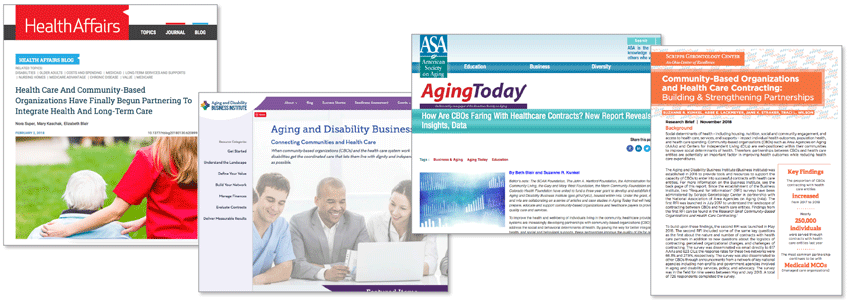National research collaboration making a difference


The landscape of health and long-term care is shifting to better provide holistic person-centered and high-quality care for people of all ages. Age-friendly health systems and an increasing focus on the social determinants of health are manifestations of this shift. These frameworks both emphasize the integration of community-based services and supports with health care systems. Thanks to a long-standing partnership with the National Association of Area Agencies on Aging (n4a), and research collaborations with colleagues at University of California, Berkeley and Yale University, Scripps Gerontology Center is contributing information to help shape these transformations.
The Aging Network has long been the hub for coordination and delivery of community-based services to older people nationwide. Our work with n4a has allowed us to document and support the capacity of these foundational organizations. Scripps and n4a have partnered for over a decade to conduct comprehensive Area Agency on Aging (AAA) and Title VI organization surveys that describe their capacity, and help them chart the course for the future. That longitudinal survey data is also the basis for an exciting research collaboration with colleagues at University of California, Berkeley, and Yale University to analyze the impact of AAA partnerships on county-level health care utilization and spending across the US.
A new dimension of the n4a/Scripps collaboration surrounds the Aging and Disabilities Business Institute (ADBI), developed in 2016 by n4a in partnership with leading organizations in the field. The goal of the ADBI is to provide tools, resources, training, and technical assistance to build and strengthen partnerships between aging and disability community-based organizations (CBOs) and the health care system. Scripps serves as the evaluator for this national center, examining the impact of the ADBI on contracting activity among CBOs and health care entities.
In 2018, Scripps administered the second of two national surveys requesting information about the number and nature of these contracts. Our results provide a wealth of information indicating CBOs are well-positioned to improve the health and well-being of their constituents through services and programs provided in partnership with health care organizations. Our work supports the ever-increasing importance of building partnerships between CBOs and health care entities to address social determinants of health, improve health outcomes, and reduce health care costs.

